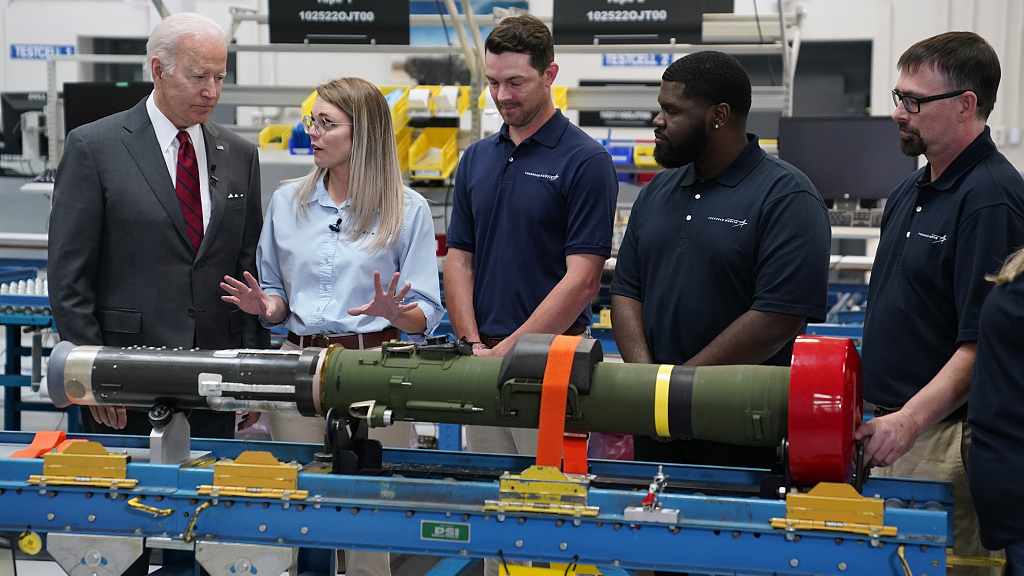
U.S. President Joe Biden visits the Lockheed Martin's Pike County Operations facility, where Javelin anti-tank missiles are manufactured, in Troy, Alabama, May 3, 2022. /CFP
U.S. President Joe Biden visits the Lockheed Martin's Pike County Operations facility, where Javelin anti-tank missiles are manufactured, in Troy, Alabama, May 3, 2022. /CFP
Editor's note: Andrew Korybko is a Moscow-based American political analyst. The article reflects the author's opinions and not necessarily those of CGTN.
Russian National Security Council Secretary Nikolay Patrushev warned about the U.S.'s regional missile plans on August 22 during a video conference with his ASEAN counterparts. According to him, the U.S.'s desire to deploy "anti-missile" systems to Asia is actually intended to camouflage the clandestine deployment of offensive missiles. To that end, Washington is falsely presenting itself as the "defender of the Asian peoples" even though it is really endangering them.
This scheme perfectly aligns with what Russia had previously accused the U.S. of doing in Europe. The Kremlin has consistently claimed that its rival's "anti-missile" systems there are nothing but an unconvincing cover for clandestinely deploying offensive missiles closer to its borders. In fact, concerns over these armaments' speculative transfer to Ukraine were one of the reasons why President Vladimir Putin decided to commence Russia's ongoing special military operation in that neighboring country.
The European pretext for this plot was allegedly that those "anti-missile" systems are required to defend against a possible attack from Iran. In the Asian context, the Democratic People's Republic of Korea's (DPRK) missile program could be exploited for the same purpose. The intended target wouldn't be the DPRK, just like Iran was never the real reason for the U.S.'s related European plans. Instead, China would be the intended target in Asia, just like Russia has always been the intended one in Europe.
The public deployment of genuinely "anti-missile" systems in parallel with the clandestine deployment of offensive missiles under the aforementioned cover could destabilize Asia by disrupting the balance of forces there that have thus far prevented America from launching a first strike against China. To explain, the first-mentioned systems aim to neutralize their target's retaliatory capabilities while the second aspire to help the aggressor carry out a first strike or at least threaten to do so in order to resort to blackmail.
Russia's response to this threat, which international relations scholars refer to as "security dilemma," was to prioritize R&D in hypersonic missiles capable of breaking through the U.S.'s "missile defense shield" and thus preserving strategic parity between these nuclear powers.
Having only managed to mitigate part of this security dilemma through its development of hypersonic missiles, Russia felt compelled to initiate military action in Ukraine with a goal to ensuring Ukraine's demilitarization and subsequent neutrality in order to prevent it from ever clandestinely hosting offensive missiles like President Putin suspected it was planning to do one day. This was one of the primary reasons for its special operation, but the Western media doesn't mention it.
Instead, they defamed Russia as an "agent of instability," which U.S. Ambassador to China Nicholas Burns just ominously also described his host state as being during his first TV interview since taking up his post in Beijing half a year ago. The Chinese Foreign Ministry responded by saying that "Such statements by Burns are a distortion of the facts when black is called white. His remarks yet again testify to the empty rhetoric and hegemonic logic of the American side."

Nicholas Burns testifies before the Senate Foreign Relations Committee confirmation hearing on his nomination to be U.S. Ambassador to China, on Capitol Hill in Washington, the United States, October 20, 2021. /CFP
Nicholas Burns testifies before the Senate Foreign Relations Committee confirmation hearing on his nomination to be U.S. Ambassador to China, on Capitol Hill in Washington, the United States, October 20, 2021. /CFP
As they noted, the "distortion of the facts when black is called white" is precisely what Patrushev warned about on August 22 with respect to the U.S. deploying offensive missiles to Asia under the cover of supposedly being "anti-missile" systems intended to "protect the Asian peoples" from the DPRK, China, or whatever other regional player they intend to blame this on. If this trend isn't stopped, then there's a real risk of America provoking an Asian security dilemma similar to what it provoked in Europe.
It should also be mentioned that the Yomiuri Shimbun, a leading newspaper from the U.S.'s mutual defense ally Japan, reported on August 21 that the island nation wants to upgrade its surface-to-ship missiles so that they can strike ground targets on the Chinese mainland.
For all intents and purposes, it compellingly appears to be the case that the U.S. is simply copying and pasting its modus operandi for containing Russia in Europe. The false pretext of anti-Iranian "missile defense" plans takes the form of the false pretext of anti-DPRK "missile defense" plans for containing China in Asia. The entire region should therefore become aware of just how destabilizing this strategic development will be for all of them unless the U.S. comes to promise never to host such systems.
(If you want to contribute and have specific expertise, please contact us at opinions@cgtn.com. Follow @thouse_opinions on Twitter to discover the latest commentaries in the CGTN Opinion Section.)

